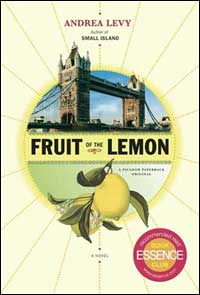
Andrea Levy’s warm and loving literary postcard from Jamaica presents a long, diverse, and dynamic family history — a vivid blend of personalities, nationalities, and even prejudices, without being judgmental. The challenges of straddling two cultures can be readily found in modern fiction, but in Levy’s capable and empathetic hands (Levy herself is the daughter of Jamaican immigrants), the insulated story of the Jackson family — as told in Levy’s novel Fruit of the Lemon — has a timeless quality that makes this 1999 novel worthy of its new Picador reissue, and a recommended read of the Essence magazine book club.
All parents dream of a life for their child that’s better than their own. Jamaican immigrants Mildred and Wade Jackson are no different, wishing only the best for their daughter, Faith. So after moving to London, Faith’s parents remained tight-lipped about their hometown, leaving their daughter to wonder about being teased at school: “Faith’s a darkie and her mum and dad came on a banana boat.”
“It was a proper boat with cabins and everything,” says her mother. “Even had a dance every evening and we took turns to sit at the captain’s table. What, you think we sit among the bananas?” But Faith’s notions of her family’s past remain sketchy — stitched-together bits and pieces she gleans from offhand comments over the years. It isn’t until she begins her professional career in television, moves out of the cocoon of her parents’ home, and her mother and father begin to speak of going “home” to Jamaica, that Faith’s identity and self-awareness are shaken to the very core.
At the same time, experiences arise that open Faith’s eyes to the existence of racism: Despite getting a promotion at work, she’s still effectively held back; a white woman she and her brother go to see about a used car behaves as if they’re about to rob her; a terrible incident of urban violence highlights the differences between her and her white friends. These events begin to unmoor Faith from all she had grown to believe about herself and her identity.
Desperate to rescue their daughter from an emotional tailspin, Faith’s parents decide to send her to Jamaica for a visit with her maternal aunt Coral. Thus, Faith begins her journey completely unaware of her Jamaican heritage, blinded by her own assumptions and stereotypes about life on the Caribbean island. Once there, through the storytelling of her relatives, she learns of her parents’ rich social, cultural, and economic heritage, and of her extensive family tree æ men and women who loved in the face of racial and class prejudice, lived under the shadow of harsh economic conditions, and yet still prized family above all. She begins to develop, for the first time, her own ethnic and cultural identity.
Elements of Faith’s sudden revelations feel a bit unbelievable. Though in England she carries on a longtime friendship with a woman whose father is blatantly racist, she maintains an implausible lack of awareness about prejudice until her arrival in Jamaica. But Levy, whose novel Small Island won the Whitbread Book of the Year Award and the Orange Prize, shows obvious skill in building a moving narrative that is sentimental without being saccharine. Throughout the novel, she deftly captures the speech patterns and styles of her British and Jamaican characters, and wisely avoids caricature and stereotype, imbuing Faith’s family and friends with staunch individuality in thought, word, and deed.
The structure of the book is particularly effective: Family legends and stories are threaded throughout Faith’s narrative, with each new tale accompanied by an ever-expanding family tree diagram that incorporates the previous story. The initial tale of Mildred and Wade is thin and spare, but as Faith learns more about her family history, the tales become more dramatic and lively, visually and thematically infusing the family with life.
As her visit to Jamaica comes to an end, Faith is finally open to incorporating her Jamaican culture into her English identity. “Let them say what they like. Because I am the bastard child of Empire and I will have my day.” In the end, neither her Jamaican heritage nor her Englishness is completely subsumed by the other. Proud to draw upon the strength of her Jamaican roots, Faith returns to England triumphant, the roots of the lemon tree holding firmly while the new branches reach ever upward, distant blooms bearing fruit.
- Follow us on Twitter: @inthefray
- Comment on stories or like us on Facebook
- Subscribe to our free email newsletter
- Send us your writing, photography, or artwork
- Republish our Creative Commons-licensed content

